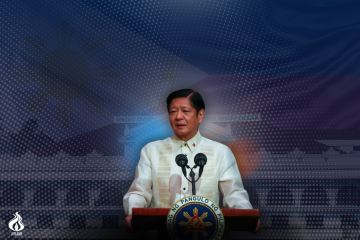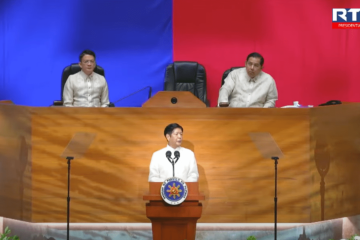
ARTS AND Letters Faculty Association (ALFA) president alleged that the three-unit incentive chargeable to the tuition fee increase (TFI) share of faculty members and other Collective Bargaining Agreement (CBA) provisions were products of “backdoor” negotiations.
ALFA President Danielito Jimenez filed a grievance complaint to Jose Ngo, University of Santo Tomas Faculty Union (USTFU) vice president for grievance and complaints, claiming that USTFU President George Lim closed the negotiations with the University’s top ranking officials.
“Reportedly, it was a backdoor negotiation,” Jimenez, a labor lawyer, said. “He never told the assembly about the supposed letter he sent to UST. Where are those exchanges of communications? In the interest of transparency, these should be shown so we know if there was even an attempt for the USTFU to fight for this.”
In a written response to the Flame, Ngo affirmed the allegations of Jimenez, saying “under the pressure of a looming strike in the University because of CBA deadlock, the USTFU president and the rector (Rev. Fr. Herminio Dagohoy, O.P.) went on one-on-one sans the other members of the bargaining panels for both sides.”
Citing the letter of former USTFU Vice President for grievance and complaints Reynaldo Reyes to faculty members on March 20, 2014, Jimenez also wrote in his grievance complaint that there were also several CBA benefits given up by Lim in favor of UST during the closed negotiations which were then ratified by the majority of the members during a general assembly.
These benefits were matters regarding contractual appointment, probationary evaluation of the faculty members, teaching loads of contractual appointees, seniority rule, accumulated sick leave of resigned or retired members, study leave, leave of absence without pay, and tardiness.
“Because of so many that [were] given up, the three-unit incentive would have been the only benefit that the teachers would have gotten since this is over and above labor standards,” Jimenez added.
“The CBA, a contract often described as imbued with public interest, was perfected with the meeting of minds of only two persons and presented to the rest of the members of a bargaining panel as a done deal,” Ngo said.
The Flame tried to reach Lim for comments but to no avail. However, in his letter addressed to all faculty members last Oct. 24, Lim clarified that all CBA panel decisions under his term were collectively made and done through votation.
“All past Union CBA Panel decisions under my leadership were made collectively […] This stand was then brought before the USTFU Board for further discussions where a final position was taken. This was subsequently relayed to the University panel for reconsideration. To reiterate, I did not alone make a stand for USTFU,” Lim wrote.
But during the USTFU general assembly last Sept. 30, Jimenez said Lim disclosed that the TFI share was the source of the three-unit incentive of associate professors.
“It says there […] Article 15, which says these economic benefits must be taken from the share. That’s clear. But with respect to this three-unit incentive, Article 27, it doesn’t say there that these shall be taken from the TFI share,” Jimenez said.
Article 27 Sec. 3.2 of the CBA states that the “University agrees to give a monthly salary equivalent to 24 unit load for a 21 actual teaching load on a staggered basis.”
The three-unit incentive was meant to address the faculty members whose teaching loads would be reduced from the maximum 24 units to 21 units due to the K to 12 program. With this, faculty members will still be paid the amount equal to 24 units despite the reduced load.
“It has to come from the University’s own pocket. That’s the only way you can justify it,” Jimenez said.
Lim wrote a letter to the University officials questioning the policy after knowing that the administration wanted to counter what was stated in the CBA.
“The UST administration, however, has made the claim that the funding of this three-unit reduction schema is chargeable to the share of the faculty in the tuition fee increase,” Lim wrote.
Lim also said the three-unit reduction to faculty members would provide teaching loads to those who would be de-loaded or retrenched during the full swing of K to 12.
CHED Memorandum Order No. 08 Series of 2012 states that 70 percent of tuition fee increases shall be used for the benefits of teaching and non-teaching personnel and other staff, including those that are provided by the CBA.
But Jimenez said Lim told USTFU members that they will not expect any distribution from the TFI as the University charged the three-unit incentive for associate professors from the TFI share which would incur a loss of about P50 million.
“If we look at the provision of the CBA, it’s very clear. It says there that the University shall give. Now, can you give something that is not yours? Now in my position as a lawyer and as a labor law practitioner, the one that is reserved for the employees by law is no longer that of to University,” the ALFA president said.
Call for resignation
In the USTFU general assembly last Sept. 30, Jimenez said the clamor for Lim’s resignation as USTFU president came after he said he would not fight for the members’ rights on the three-unit incentive.
“Kay Lim nga ‘yung refusal niya to act for the best interest of the members is the one that is being questioned […] He is not telling everyone: ‘Okay I will fight for this, I will fight for your rights.’ That is what we felt where he fell short as a leader,” Jimenez said.
Jimenez also wrote in his grievance complaint that the action taken by Lim is an impeachable offense for “betrayal of trust” of the USTFU members, claiming that Lim’s position is not legally and morally right as it countered the CBA.
Ngo said if the Union does not operate in line with its members’ interest, then the leadership must be replaced through impeachment or clamor for resignation as it has damaged the faculty’s trust. He also noted that it could come into worse terms should USTFU not serve its members well.
“The worst scenario is that it might even result into the disbanding of the union itself should the union engage itself ‘company unionism’ […] gratuitously giving up benefits without counter-benefit given by the other side,” he said.
Grievance complaint ‘virtually denied’
Ngo said in his letter to the vice rector for academic affairs last Nov. 11, Prof. Clarita Carillo “virtually denied” the grievance complaint, saying it was “beyond the definition of grievance between the employer and the University.”
But Ngo, who forwarded Jimenez’s grievance complaint to Carillo last Oct. 17, joined Jimenez’s position saying it is valid and the funding of the three-unit incentive must be funded by the University and not from the faculty’s TFI share.
“Whatever the University has already taken from the said share of the faculty members […] should be returned, reverted and restored to the share of the faculty members in their tuition fee increase for the said academic years,” Ngo wrote.
If not settled by the administrator concerned, the complaint would be elevated to the Grievance Committee. It consists of four members, two appointed by USTFU and two by UST. If still not settled, it will then be forwarded and intervened by the Department of Labor and Employment as provided by the grievance machinery, Ngo noted.
As Ngo supported Jimenez’s stance, he also said he encouraged other faculty members to be a complainant and not just a “rider” on what the ALFA president initiated as they could lose millions in their TFI share. F VANN MARLO M. VILLEGAS and MARIA EDEN T. DINO



